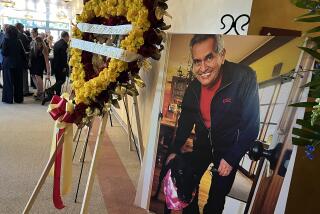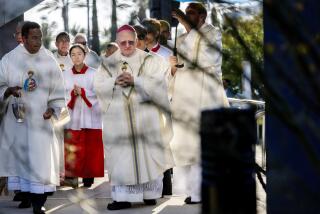Bishop Speaks Against Memorial Services
- Share via
Saying that having the deceased’s body present in church is “powerful witness” to Christian beliefs, the Episcopal bishop of San Diego has strongly urged parishioners to arrange funeral services rather than memorial services for their loved ones.
“The casual reading of obituary notices indicates that in a high percentage of cases there is no service of any kind held, not even a memorial service,” Bishop Brinkley Morton said in an interview.
Newspaper death notices do not necessarily reflect how Episcopalians or members of other religions are handling burial plans, Morton said, adding that he was not criticizing current practices in his diocese, which has 23,000 active Episcopalians in San Diego and Imperial counties and the southern part of Riverside County.
“I just think these are things that need to be said once in a while,” he said.
Nevertheless, Morton wrote two columns on the subject for his diocesan newspaper, quoting in the first a New York City pastor’s lament “at the gradual increase in memorial services when funerals could be had.”
Morton advised “in the strongest terms” that funerals be held in the parish church with the body present. He suggested that Episcopalians send for a diocesan pamphlet on Christian burial.
The diocesan pamphlet, explaining the symbolism involved, said that funeral parlors exist only because of death but that the church “is a place consecrated to celebrate birth, new life, marriage, death and resurrection . . . Dying is the process of returning to that from which we came and to Him from whom we came.”
The pamphlet also advises that if the body is cremated before the service, the remains should be present in a funeral service, perhaps in a box large enough to hold the urn.
Morton suggested additionally: “Cremation is a permissible manner of disposal of a body, but this can be done after the funeral in the church.”
Asked by a churchgoer for his views about donating one’s body or organs for medical research, Morton wrote that organ donation “is a genuinely Christian act.” After the organs are removed, the body can be received by the mortician and prepared for burial, he said.
The bishop said that only when a medical school has accepted a donated body would a memorial service be appropriate in the church.
A 950-family synagogue in North Hollywood has hired Rabbi Leslie Alexander of San Diego as an assistant rabbi--the first woman to receive a pulpit appointment at a large congregation affiliated with the Conservative wing of Judaism.
A spokeswoman for Adat Ari El, whose senior rabbi is Moshe Rothblum, said Alexander will continue in her current job directing community education and adult activities for the Jewish Community Centers of San Diego through the end of June.
Alexander, 31, who grew up in the Conservative Jewish tradition but was ordained a Reform rabbi in 1983, is the third Reform woman rabbi to be hired by a Conservative institution. Two other women have been ordained by the Jewish Theological Seminary of America since ordination of women was given final approval by the Conservative movement in early 1985. Alexander is the first to be hired as a pulpit rabbi by a large synagogue, the temple spokesman said.
Alexander majored in history as a UCLA undergraduate and studied at the University of Judaism before taking rabbinical training at the Reform movement’s Hebrew Union College in New York.
Religion professors at three West Coast colleges of the Seventh-day Adventist Church have approved a resolution supporting the ordination of women in the 4.5-million-member denomination, according to Jim Walters of Loma Linda University.
Two years ago, after a special commission studying the question recommended no action--because the issue was too divisive, among other reasons--the Adventists’ Spring Council voted to postpone a decision for three to five years.
By a vote of 40 to 0, with one abstention, religion teachers at Loma Linda, Pacific Union College, Angwin, Calif., and Walla Walla College, College Place, Wash., approved a statement this month that said in part:
“We believe, while recognizing a measure of disagreement on this subject in the church, that our denomination should now encourage the ordination of women in North America and wherever else this step will enhance the mission of the church. We pledge to encourage women with a divine calling to prepare themselves for ministerial service.”
A survey of North American Adventists released in 1984 showed that only one-third favored ministerial ordination for women. Walters said the issue is hotly debated at the Adventists’ seminary at Andrews University, Berrien Springs, Mich.
More to Read
Sign up for Essential California
The most important California stories and recommendations in your inbox every morning.
You may occasionally receive promotional content from the Los Angeles Times.













